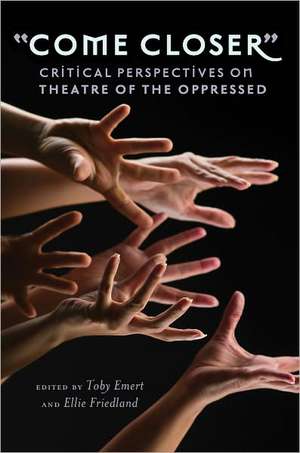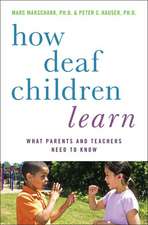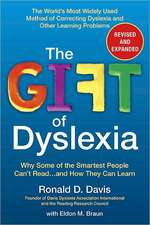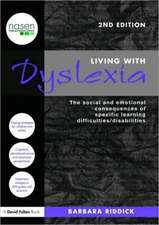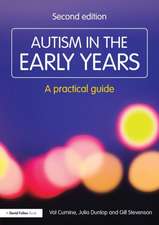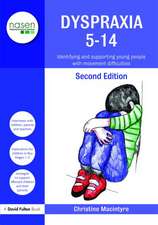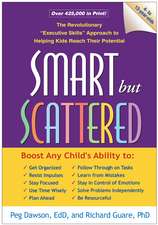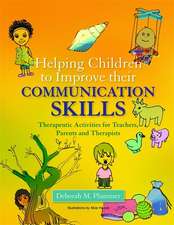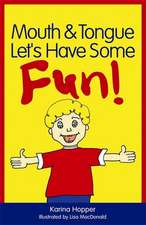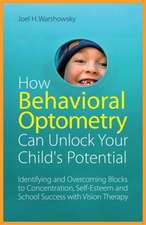-Come Closer-: Critical Perspectives on Theatre of the Oppressed: Counterpoints, cartea 416
Autor Toby Emert Editat de Ellie Friedlanden Limba Engleză Paperback – 31 mai 2011
In 'Come Closer,' community activists, scholars, and theatre artists describe their Theatre of the Oppressed (TO) work and how they are transforming TO for new purposes, new audiences, and new settings. Each chapter features a first-person narrative on how the authors' work both honors and transforms the vision of Augusto Boal, whose imaginative response to human oppression offers the world an aesthetic intervention that has the power to move both the oppressors and the oppressed to the possibility of transformative dialogue. Contributors to this important volume center their ideas and their descriptions of their practice within theoretical frameworks, particularly Paulo Freire's Pedagogy of the Oppressed. 'Come Closer' will be useful to undergraduate and graduate students, as well as administrators and professors interested in the topic of democratic education.
Din seria Counterpoints
- 19%
 Preț: 429.12 lei
Preț: 429.12 lei -
 Preț: 404.05 lei
Preț: 404.05 lei - 23%
 Preț: 444.05 lei
Preț: 444.05 lei - 23%
 Preț: 469.25 lei
Preț: 469.25 lei -
 Preț: 242.19 lei
Preț: 242.19 lei -
 Preț: 441.24 lei
Preț: 441.24 lei -
 Preț: 495.42 lei
Preț: 495.42 lei -
 Preț: 335.22 lei
Preț: 335.22 lei -
 Preț: 495.42 lei
Preț: 495.42 lei -
 Preț: 390.39 lei
Preț: 390.39 lei -
 Preț: 497.33 lei
Preț: 497.33 lei - 23%
 Preț: 619.83 lei
Preț: 619.83 lei -
 Preț: 496.57 lei
Preț: 496.57 lei -
 Preț: 371.10 lei
Preț: 371.10 lei -
 Preț: 499.24 lei
Preț: 499.24 lei -
 Preț: 418.62 lei
Preț: 418.62 lei - 27%
 Preț: 743.63 lei
Preț: 743.63 lei -
 Preț: 387.89 lei
Preț: 387.89 lei -
 Preț: 375.44 lei
Preț: 375.44 lei -
 Preț: 431.05 lei
Preț: 431.05 lei -
 Preț: 499.62 lei
Preț: 499.62 lei -
 Preț: 498.87 lei
Preț: 498.87 lei -
 Preț: 304.41 lei
Preț: 304.41 lei -
 Preț: 391.56 lei
Preț: 391.56 lei - 23%
 Preț: 619.24 lei
Preț: 619.24 lei - 23%
 Preț: 459.63 lei
Preț: 459.63 lei -
 Preț: 406.77 lei
Preț: 406.77 lei -
 Preț: 337.95 lei
Preț: 337.95 lei -
 Preț: 234.42 lei
Preț: 234.42 lei -
 Preț: 392.33 lei
Preț: 392.33 lei -
 Preț: 408.72 lei
Preț: 408.72 lei -
 Preț: 412.16 lei
Preț: 412.16 lei
Preț: 348.21 lei
Nou
66.64€ • 69.18$ • 55.56£
Carte tipărită la comandă
Livrare economică 24 martie-07 aprilie
Specificații
ISBN-10: 1433113708
Pagini: 198
Dimensiuni: 150 x 224 x 13 mm
Greutate: 0.32 kg
Ediția:New.
Editura: Peter Lang Gmbh, Internationaler Verlag Der W
Seriile Counterpoint S., Counterpoints
Notă biografică
Toby Emert is a theatre artist and professional educator who has worked with hundreds of pre-service and in-service teachers across the United States on methods to combine literacy instruction and the arts. He holds a BA in English and Theatre Education from Longwood College, an M.Ed. in Educational Administration from the College of William and Mary, an MA in English from the University of Tennessee, and a PhD in Education from the University of Virginia. He is an associate professor in the Department of Education at Agnes Scott College near Atlanta, Georgia, and he also teaches drama-based education courses, including Drama for Community Leadership, through the Creative Arts in Learning graduate program at Lesley University in Cambridge, Massachusetts. His research agenda includes explorations of the connections between deep learning and artistic expression particularly how theatre-based structures can be adapted for any classroom content. He served on the Board of Directors for Pedagogy and Theatre of the Oppressed for six years and was president of the organization in 2008-09. Ellie Friedland has been an activist teacher educator, writer, and performer for more than 25 years, specializing in teaching for social justice, and integrating drama, Theatre of the Oppressed, and movement into early childhood education and teacher education and professional development. She is Associate Professor of Early Childhood Education at Wheelock College in Boston, where her research and publications focus on teaching anti-bias early education, especially LGBT inclusive practice, in the U.S. and Guatemala, culturally competent teaching and learning, and teaching through drama. She holds a B.S. in Human Development and Family Studies/Nursery-Kindergarten Education from Cornell University, an M.S. in Human Behavior and Development from Drexel University, and a PhD in Education and the Arts from The Union Institute in Ohio. She leads workshops for teens and adults in Theatre of the Oppressed for the Wheelock Family Theatre, nationally renowned for its long history of inclusive, community-based theatre. She served on the Board of Pedagogy and Theatre of the Oppressed for seven years and was president of the organization from 2005-2007.
Cuprins
Contents: Michael Rohd: Foreword - Toby Emert/Ellie Friedland: Introduction - Doug Paterson: Putting the 'Pro' in Protagonist: Paulo Freire's Contribution to Our Understanding of Forum Theatre - Marc Weinblatt/Cheryl Harrison: Theatre of the Oppressor: Working with Privilege Toward Social Justice - Brent Blair: The Complex: Theatre of the Oppressed, Trauma, and the Seventh Shift - Ellie Friedland: Integrating Theatre of the Oppressed into Higher Education: Transformation or Technique? - Toby Emert: Dramatizing Success: Boal Enters the High School Language Arts Classroom - Jennifer L. Freitag/Danielle Dick McGeough/Aubrey Huber/Karen S. Mitchell: The Boalian Communication Classroom: A Conversation about the Body, Dialogue, and Social Transformation - Jenny Wanasek/Mark Weinberg: The One-Line Play: Elaborations on Image Theatre - S. Leigh Thompson/Alexander Santiago-Jirau: Performing Truth: Queer Youth and the Transformative Power of Theatre of the Oppressed - Sonja Arsham Kuftinec: Rehearsing for Dramatic Change in Kabul - Richard J. Piatt: Faith Acts: Exploring the Possibilities for Theatre of the Oppressed and Liberation Theology - Raphi Soifer: Last-Minute Theatre: Bringing Boal Behind Bars - Jiwon Chung: Theatre of the Oppressed as a Martial Art - Hector Aristizábal/Diane Lefer: The Wounded Joker - Chen Alon: Non-Violent Struggle as Reconciliation Combatants for Peace: Palestinian and Israeli Polarized Theatre of the Oppressed - Toby Emert/Ellie Friedland: Considering the Future of Theatre of the Oppressed: An Interview with Julian Boal.
